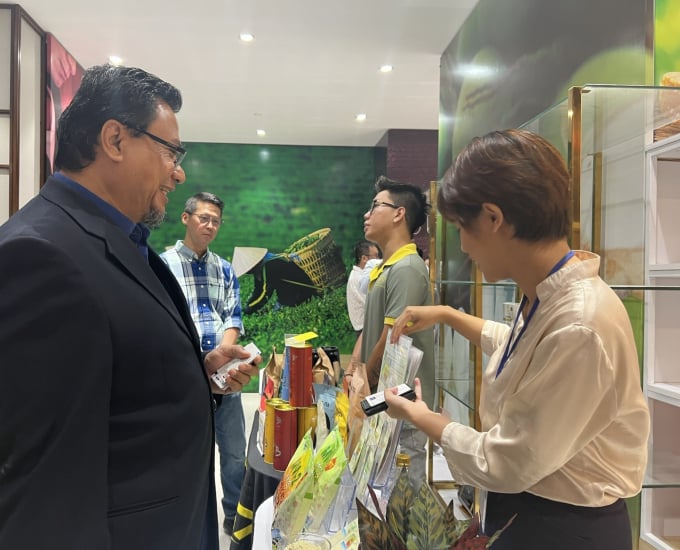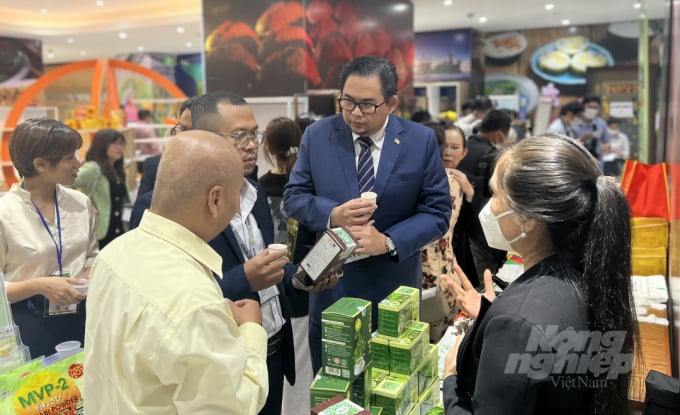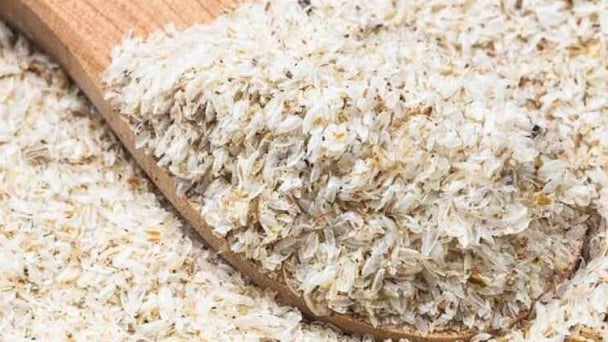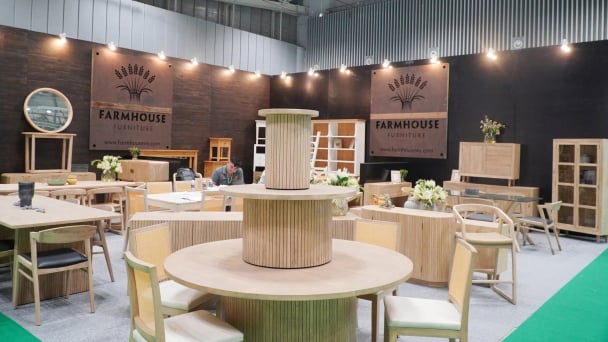May 29, 2025 | 03:13 GMT +7
May 29, 2025 | 03:13 GMT +7
Hotline: 0913.378.918
May 29, 2025 | 03:13 GMT +7
Hotline: 0913.378.918

Dr. Halim Bin Husin, Chairman of Malaysian Chambers of Commerce, learning about some Vietnamese products displayed at the workshop. Photo: Nguyen Thuy.
The Workshop on "Promoting exports to the Malaysian market and Muslim countries" was organized on June 2 by the Investment and Trade Promotion Center in Ho Chi Minh City (ITPC) in collaboration with the Malaysia External Trade Development Corporation (Matrade) and Beyond World Co., Ltd.,; Mr. Tran Viet Thai, Vietnam's Ambassador Extraordinary and Plenipotentiary to Malaysia, said that after a 2-year hiatus due to Covid-19, along with the impact from the Russia-Ukraine war, many countries are now forced to rearrange their interrupted supply chains. "This is a great and unprecedented opportunity for Vietnamese and Malaysian businesses to seize and participate in the supply chain during the rearrangement process", said Mr. Thai.
Vietnam's Ambassador Extraordinary and Plenipotentiary to Malaysia said that since the Russia-Ukraine war, wheat exports from Russia and Ukraine to other countries, including Malaysia, have been completely interrupted, heavily affecting Malaysia's food security. As a result, during a recent visit by the Prime Minister of Malaysia, the Malaysian government raised the quota of Vietnamese imported rice from 520,000 tons/year to 700,000 tons/year to ensure food security. This poses great opportunities for Vietnamese businesses in exporting rice from Vietnam to Malaysia.
However, Mr. Tran Viet Thai said that, Vietnamese businesses should pay attention to Halal certified products when exporting to the Malaysian market; they need to build a better brand and bring Vietnamese high-end brands to Malaysian consumers; the current distribution and marketing systems are still inefficient; they must also take note of price pressure cases.
Agricultural and aquatic products must ensure that the raw material area qualify for food hygiene and safety, pesticide residues standards as well as separate regulations on Halal certification. A Vietnamese businesses was unable to export chili and other spice products to Malaysia recently due to higher than standard level of pesticide residues.
Dr. Halim Bin Husin, Chairman of the Malaysian Chambers of Commerce, recommends that Vietnamese businesses should obtain Halal certifications to be able to supply Vietnamese agricultural and food products to the Malaysian markets as well as other Muslim countries. "Vietnamese businesses need to improve their food export capacity to Malaysia, to help alleviate the high food prices in Malaysia. We have an increasing need to import food products and diversify the supply for Malaysian consumers" said the chairman.
"For the past two weeks, the prices of food products including chicken in Malaysia have skyrocketed, with some increasing by 20 to 40%. Consequently, Malaysia has stopped exporting chicken to some countries including Singapore; this in turn has increased Singapore's import demand for chicken and agricultural products.This is a potential opportunity for businesses in Vietnam to export agricultural products and food into the Malaysian and Singaporean markets", said Mr. Thai.
According to Ambassador Tran Viet Thai, Vietnamese businesses also need to carefully study their partners to avoid being scammed.
Mr. Raphy MD Radzi, Commercial Consul under Malaysia External Trade Development Corporation, said that Malaysia currently suffers from a shortage of chicken and rice with a sudden increase in demand. "Malaysia currently has an urgent need for chicken, especially Halal-certified chicken to serve the post-Covid-19 crisis. Therefore, Malaysia wants to import Vietnamese rice and chicken". Mr. Raphy MD Radzi said.
According to Mr. Raphy MD Radzi, Malaysia is the worldwide hub for the supply chain of Halal products. It is expected that by 2025, the value of the Malaysian Halal industry will reach 14 billion USD. Accordingly, Malaysia has an ecosystem for Halal products from consulting, providing certificates to disseminating and training following Halal standards.
Mr. Tran Phu Lu, Deputy Director of ITPC, said that the world market for Muslims' Halal food is valued at 1.5 trillion USD. This is also considered a promising market for Vietnamese businesses. However, Vietnam's export capacity for Halal products is still modest, reaching only 10.5 billion USD in 2021. Southeast Asia - South Asia - South Pacific is the the largest Halal product consuming area in the world at nearly 470 billion USD.

Mr. Raphy MD Radzi (wearing glasses) learning about Vietnamese coffee. Photo: Nguyen Thuy.
"Vietnam is one of the major agricultural and aquatic product exporters in the world, located geographically near major Halal markets. However, our actual food import and export in the Halal market is still in its infancy.
Every year, our country has 50 Halal-certified companies with main products include seafood, beverages, canned food, confectionery, vegetarian food and pharmaceuticals”, informed Mr. Tran Phu Lu.
Ms. Kelly Luong Hue Hien, Director of Beyond World Company, said that in October, the company will organize a survey trip directly to the Malaysian market, so that Vietnamese businesses can approach large importers, Malaysian Chamber of Commerce to introduce products to consumers, supermarkets, large distributors in Malaysia.
Malaysia is an import market with great potential for Vietnam in the ASEAN region, the trade relationship between Vietnam and Malaysia still has a lot of room to promote trade cooperation in many fields including machinery and equipment, food, beverages, agricultural products, aquatic products, personal care products, etc.
In 2021, Vietnam is the 11th largest trading partner and the 7th largest export market for Malaysia with a bilateral trade turnover of 11.8 billion USD. Both countries are striving towards a bilateral trade turnover of 25 billion USD by 2030. However, this number is still modest compared to the great potential and prospects of cooperation between the two countries.
According to statistics by the General Department of Customs, Vietnam's export turnover to Malaysia reached nearly 1.7 billion USD, up by 12% over the same period last year.
Translated by Nguyen Hai Long

(VAN) The import-export turnover between Vietnam and Singapore rose amid a trade rebound, with machinery, electrical equipment, and fuels making up the majority of the transaction value.

(VAN) Director General of the General Administration of Customs of China, Ms. Sun Mai Jun, has pledged to implement measures that will ease the import process for Vietnamese agricultural products.

(VAN) Although Vietnam is still increasing its coffee exports, the industry is currently in the process of determining market strategies in response to the U.S. imposition of reciprocal tariffs.

(VAN) With rising demand in Muslim-majority countries, Halal certification is becoming a critical passport for Vietnamese agricultural products seeking sustainable market access and consumer trust in the Middle East and Africa.

(VAN) Vietnam’s fruit and vegetable exports to the U.S. are rising sharply, and exporters are hoping that any upcoming reciprocal tariffs will be set at manageable levels.

(VAN) Despite meeting quality standards, Vietnamese rice bran exporters still face difficulties with administrative procedures under the new protocol.

(VAN) The U.S. is tightening import tariffs and origin inspections, requiring Vietnamese businesses to proactively prepare in terms of legal compliance, supply chains, and appropriate export strategies.